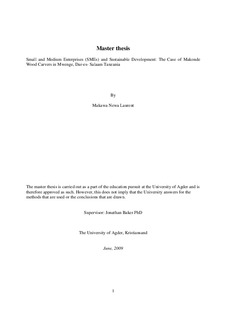| dc.contributor.author | Laurent, Makawa Newa | |
| dc.date.accessioned | 2009-11-04T08:49:22Z | |
| dc.date.issued | 2009 | |
| dc.identifier.uri | http://hdl.handle.net/11250/135135 | |
| dc.description | Masteroppgave i development management- Universitetet i Agder 2009 | en |
| dc.description.abstract | In recent years we have seen an increase in demand for the wood carvings products especially
those made using ‘Mpingo’ tree. The industry has also been a source of employment to the
majority of Makonde people and non-Makonde people conducting carving activities. Despite its
basic social and economic value, both to the carvers and all those who are engaged in the carving
activities, it has been noted however that with increasing demand for the ‘Mpingo’ tree it is
likely that the species is might be depleted if strong measures are not taken to assure that the
species is sustainably harvested.
This study therefore was aimed at assessing the sustainability of the carving activities and in so
doing the study assessed the impact of the carving industry to the economic welfare of the artists
and analyzed the contribution of the Makonde wood carving activities in the depletion of the
‘Mpingo’ tree.
The study was conducted at Mwenge in Dar-es –Salaam, Tanzania and Makonde wood carvers
were the case study.
The study used the qualitative research strategy and the methods of data collection included
questionnaires, observation, group discussions and interviews. In addition, secondary data from
the Ministry of Natural Resources and Tourism were used and analyzed.
The findings showed that the carving activities constitute the major source of income for the
Makonde wood carvers at Mwenge. Most of them entirely depend on carving activities to earn
their income and sustain their livelihood. It was also discovered, however, that carving activities
have direct contribution in the environmental destruction and have also been one of the causes of
‘Mpingo’ depletion. The study found out that the ‘Mpingo’ tree is the most preferred tree for
carvings and rarely do carvers use other tree species for carving. Limited supply and availability
of ‘Mpingo’ logs, difficulties in getting the logs in Mwenge carving market were also identified
as among the indicators for the depletion of the ‘Mpingo’ tree.
The study revealed also that sustainability of the ‘Mpingo’ tree is threatened and in order to solve
this problem the carving activities need to be closely monitored and controlled.
It is recommended that despite the measures in place to control harvesting of forest products in
general, specific measures should be imposed to save ‘Mpingo’ from current high rate of
depletion.
It is also recommended that entrepreneurship education, and financial support is also important
for the carving industry in Tanzania for achieving economic benefits. | en |
| dc.format.extent | 8471400 bytes | |
| dc.format.mimetype | application/pdf | |
| dc.language.iso | eng | en |
| dc.publisher | Universitetet i Agder : University of Agder | en |
| dc.subject.classification | UT503 | |
| dc.title | Small and medium enterprises (SMEs) and sustainable development : the case of Makonde wood carvers in Mwenge, Dar-es-Salam Tanzania | en |
| dc.type | Master thesis | en |
| dc.subject.nsi | VDP::Social science: 200::Social anthropology: 250 | en |
| dc.source.pagenumber | 77 s. | en |
